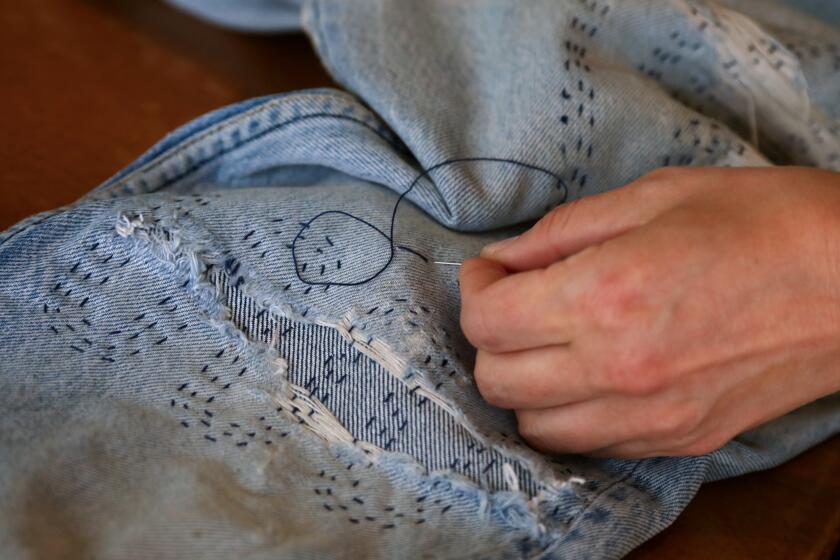Designer jeans seem recession-proof
For fashion blogger Jessica Morgan, finding the right jeans is almost a religious experience.
Morgan just bought a pair of $100 Madewell jeans, but her denim nirvana comes from True Religion Apparel Inc. of Vernon. Even at $170 to more than $300, the designer dungarees represent a sacrifice she’s willing to make despite the fraying economy.
“They make my butt look perky,” said Morgan, 33, who owns five pairs of True Religion Brand jeans. “That is the Holy Grail of jeans.”
“For women in Los Angeles, who wear jeans almost all of the time, it’s an investment,” said Morgan, half of the duo responsible for the popular “Go Fug Yourself” blog devoted to outing celebrity fashion victims. “If I wear them every day, they really are not that expensive.”
While consumer spending remains woefully depressed, expensive designer jeans have been one of the few bright spots for manufacturers and retailers, according to NPD Group Inc., a market research company.
Sales of premium brand jeans grew by 17% during 2008 and eked out a 2.3% increase in the most recent three-month period that ended in February, making premium denim one of a few “pockets of growth in an otherwise fizzling fashion market,” NPD Group said.
“That is the time period that was the most challenging in terms of consumer spending, so any growth during that time is significant,” said Marshal Cohen, NPD Group’s chief industry analyst. “With the newfound focus on fit by some of the commodity brands coupled with women’s never-ending quest for the perfect pair of jeans, the passion for denim is alive and well.”
Denim is one area in which some of the most fundamental rules of the global economy don’t appear to apply. Other industries turn to the least expensive foreign labor pools for production. Jeans makers have found that the high cost of manufacturing in the U.S. is actually a selling point.
“In the U.S., people care that their jeans are manufactured here,” said Eric Beder, an analyst for Brean Murray, Carret & Co. “To consumers outside the U.S., it’s crucial. Jeans are considered an American tradition. To be considered a real premium brand, you need to have the ‘made in the USA’ label on it.”
Adriano Goldschmied, the Italian designer of European jeans brands Diesel, Replay, Goldie and Rivet, agrees. In 2007, Goldschmied’s luxury denim label GoldSign merged with Paris-born Jerome Dahan’s Citizens of Humanity, based in Huntington Park.
“Nothing more than jeans represent the spirit of America,” Goldschmied said. “It’s about going to the mall, driving, having fun at the beach. Jeans still represent the life.”
Denim buyers aren’t going to pull the U.S. economy out of recession, but “it does show that there are people out there who are willing to pay for this sort of thing,” Beder said. “It’s a relative bargain. The most you are going to pay is $200 to $300. It’s affordable luxury. It lasts, and it has a lot of versatility that other clothing items do not have.”
Karen Short, an analyst with Friedman, Billings, Ramsey, said that this year has been tough for even the most resilient brands. Short noted that it is difficult to maintain sales at boutique clothing stores when the boutiques are folding.
Recent financial results show that the few publicly held premium jeans manufacturers are holding up fairly well.
True Religion beat analysts’ expectations with first-quarter net income that increased 10% to $7.6 million and net sales that rose 19% to $63.6 million, year over year. Joe’s Jeans Inc., a Commerce company whose pants retail for $120 and up, saw net income more than double to $800,000 and sales increase 8% to $16.5 million. Guess Inc. posted a 12% boost in adjusted net earnings of $55.3 million, excluding a $22.3-million non-cash impairment charge, and a 9% increase in revenue to $561.1 million in its most recent quarter.
But VF Corp., which owns brands such as low-cost Wrangler and high-cost 7 for All Mankind, said first-quarter profit fell 32% to $100.9 million and revenue slipped 7% to $1.73 billion as shoppers shied away from its upscale denim.
Some companies are trying to combat faltering consumer spending, in part by opening more of their own stores.
Joe’s Jeans and True Religion made up for weakness at department stores and boutiques by going directly to customers with their own stores and websites. True Religion’s direct sales increased 96% to $23.1 million. The company had 49 of its own stores by the end of the first quarter, up from 18 stores in March 2008.
“The most important thing about my jeans is the fit,” said True Religion chief Jeffrey Lubell, whose products are made in L.A. “I try to make your jeans feel like they have been in your closet for 30 years.”
At the recent opening of the True Religion store at the Westfield Century City Shopping Center, the retailer’s 51st, Scott Icenogle, a marketing director at MGM, bought a pair of straight-leg Ricky jeans. Icenogle, 39, said he was treating himself after getting a break on his 2008 taxes.
“They fit me well and I know they are going to last a long time,” the Hancock Park resident said.
Joelle Forte Casady of Castle Heights is another true believer in quality denim. The wardrobe stylist recently added to her collection of about 30 pairs, which includes five by Hudson Brand and 12 by Frankie B.
“I wear jeans five out of the seven days of the week. If I’m spending $150 to $250 a pair, I feel I’m getting my money out of it if I wear them 10 times, and I wear them a lot more than that,” Casady said. “That’s instead of some sexy heel shoes I might wear six times a year.”
“When you think it looks nice and feels right on you,” she said, “then it is worth every penny.”
--




